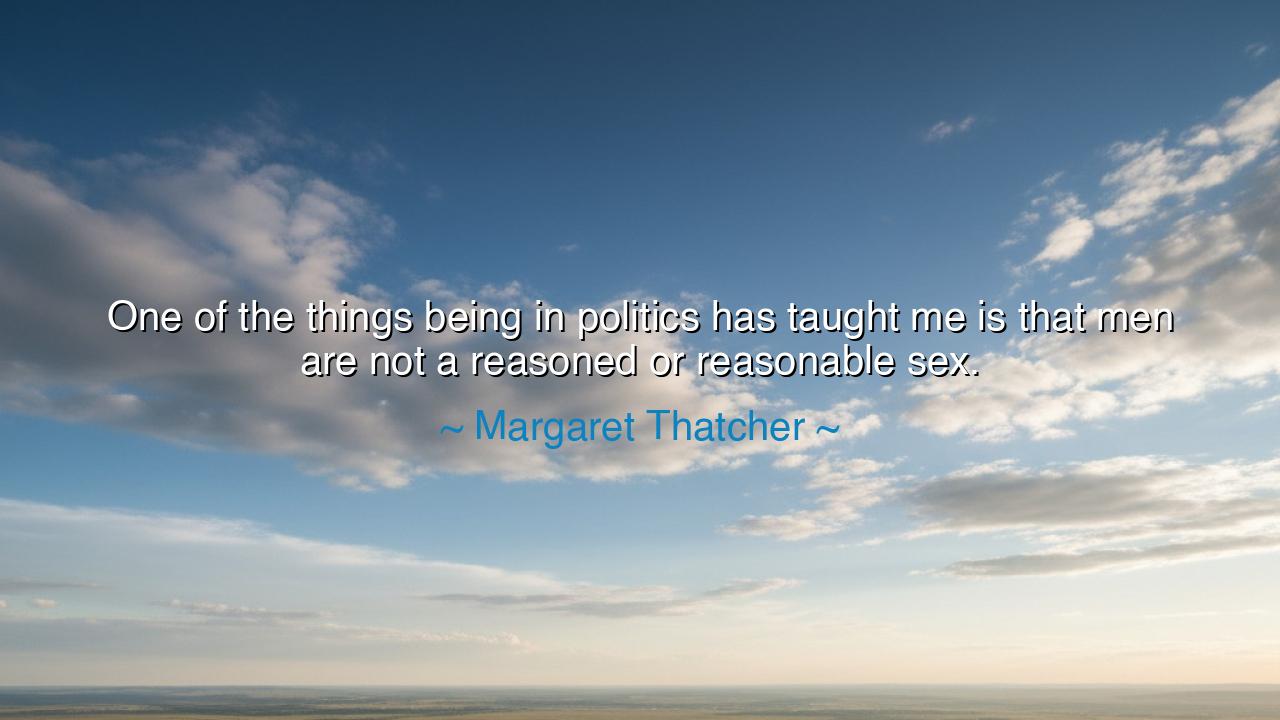
One of the things being in politics has taught me is that men are
One of the things being in politics has taught me is that men are not a reasoned or reasonable sex.






Listen, O children of wisdom, for the words of Margaret Thatcher, a woman who stood alone amidst the storm of politics, carry with them profound insight into the human condition. She said, “One of the things being in politics has taught me is that men are not a reasoned or reasonable sex.” In this bold statement, Thatcher unveils a truth about the nature of politics, and perhaps, about human nature itself: that men, despite their claims to rationality and reason, often act from a place beyond logic and reasoning, driven by emotion, desire, and instinct. This, she teaches us, is the nature of those who seek power and governance—where the heart often leads, and the mind is left trailing behind.
In the ancient world, the struggle for reason and order was a constant theme. The Greeks, particularly in the philosophical traditions, placed a high value on reason as the guiding force behind human actions. Socrates, with his method of dialectical questioning, sought to elevate human understanding to a realm of pure logic, believing that the pursuit of truth could be achieved through careful and reasoned discourse. Yet even he, in his wisdom, understood that human beings are not always driven by reason, but often by passion and emotion. The great Athenian democracy, though founded on the ideals of reasoned debate and participation, was frequently swayed by the passions of its citizens—whether in the courts or in the assembly. Thatcher’s words echo this ancient understanding: reason alone cannot govern the human heart.
Consider the Roman Republic, which rose from the ashes of monarchy to embrace a form of governance based on reasoned laws and civic duty. Yet, even in this age of reason, the influence of emotion could not be ignored. The rise of Julius Caesar, for example, was not purely a matter of political calculation, but of deep personal ambition, charisma, and the ability to appeal to the hearts of the people. Caesar’s ascent to power was marked by moments of deep emotional appeal, such as his famous crossing of the Rubicon, a symbolic and irrevocable act that defied the reasoned laws of the Republic. In this, the Romans too learned that even in the realm of politics—where laws and reason reign supreme—passion often trumps reason.
In Thatcher’s own political career, she stood as a female leader in a predominantly male-dominated political world, often battling not just the policies and challenges of her opponents but the very nature of the political game. She quickly discovered that politics, particularly in the male-dominated arena of British leadership, was not always about careful reason or logical policy decisions, but about power, influence, and sometimes, sheer force of will. Men, in this world, would often act not out of reason but out of pride, fear, or ambition, driving them to make decisions that defied common sense. Thatcher, known for her own strength and resolve, understood that to navigate such a world, one could not rely purely on reason, but must also master the emotional currents that drive human action.
The lesson in Thatcher’s words, O children, is not one of cynicism, but one of awareness. In your own lives, whether in matters of governance, leadership, or personal relationships, understand that reason alone will not always guide the course of events. Human beings, especially those who seek power, are often driven by forces that cannot be explained by mere logic. Like Caesar, Napoleon, or even Thatcher herself, men and women in positions of authority must contend with their passions as much as their reason. To be an effective leader, one must understand that emotion, desire, and instinct often shape decisions more powerfully than reasoned argument or rational discourse.
So, O children of the future, take this wisdom to heart. Know that when you seek to lead or make decisions, you must not only rely on your mind but also be aware of the emotional currents that shape your choices and those around you. Whether in the halls of power or in your daily life, understand that reason and emotion are intertwined, and both must be considered. Be wary of allowing your own passions to cloud your judgment, but also be aware that others may not always act from a place of reason, and in that, you must find a way to navigate the world. To lead effectively, to influence and shape the world, is not merely to argue with reason but to understand the hearts of those you seek to guide.
In the end, Thatcher’s message is one of balance—a call to recognize the power of both reason and emotion. Do not allow yourself to be swayed only by passion, but neither should you fall into the trap of believing that reason alone will lead to success. The path of the wise is one that understands the dance between the two, knowing when to think and when to feel, and using both to guide your actions with wisdom, power, and grace.






AAdministratorAdministrator
Welcome, honored guests. Please leave a comment, we will respond soon